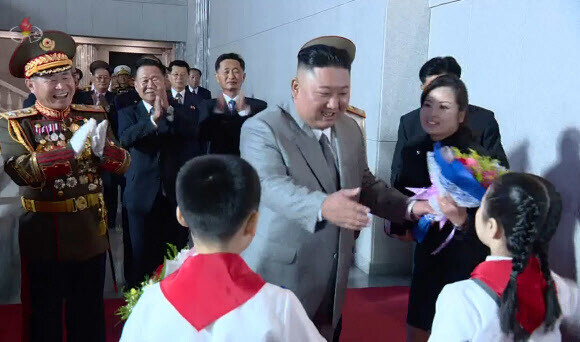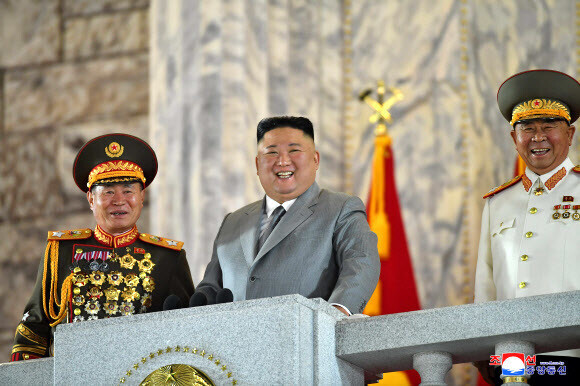hankyoreh
Links to other country sites 다른 나라 사이트 링크
Pyongyang lights up at night as N. Korea celebrates 75th WPK anniversary

The time was 12 am on Oct. 10.
With cries of amazement from the crowd as fireworks emblazoned the sky over Kim Il-sung Square in Pyongyang, a military parade kicked off to commemorate the 75th anniversary of the founding of the Workers’ Party of Korea (WPK).
Appearing in the seat of honor, North Korean leader Kim Jong-un was dressed in a gray Western-style suit and gray necktie rather than his usual black “people’s uniform.” Following the firing of a 21-gun salute, Kim addressed the crowd in horn-rimmed glasses.
“To all the people of this country and People’s Army soldiers as we greet this joyous holiday in October!” he cried out.
Early on in his speech, Kim could be heard choking up as he declared, “On the unforeseen fronts of disease control and natural disaster recovery this year, the patriotic and heroic dedication shown by our soldiers is something that cannot be witnessed without tears of gratitude.” After referring to the efforts of “capital party member corps” -- a group of Pyongyang WPK members formed to respond to typhoon damage -- he removed his glasses and wiped away his tears with a handkerchief. Kim’s remarks are also drawing attention for his reference to himself as “truly ashamed” and as “still lacking in efforts and dedication despite possessing the monumental task of leading this country.”

Analysts saw his approach as offering an unfiltered glimpse at his characteristic governing style of emphasizing the people above all else as he shared messages of gratitude and apology regarding the public’s efforts amid their struggles with COVID-19, natural disasters, and sanctions. In effect, he presented a public message of “remorse” while once again repudiating the notion of his infallibility as the “supreme dignity.” He used words of “thanks” and “gratitude” toward the public 12 times in all, including his declaration that he was “truly thankful that everyone is healthy, without any victims of the malignant [COVID-19] virus.”
Koo Kab-woo, a professor at the University of North Korean Studies, said, “What stands out the most in this speech is Kim Jong-un’s emphasis on the North Korean public first and foremost.”
“It’s quite interesting that he has presented himself in a completely different way from other socialist leaders,” Koo observed.
The unprecedented late-night military parade was shown on Korean Central Television (KCTV) at 7 pm on Oct. 10 in a broadcast lasting two hours and 16 minutes. In an arrangement befitting a military parade, Kim was flanked throughout the event by two officials in charge of the military: WPK Central Military Commission Vice Chairman Ri Pyong-chol and Chief of General Staff Pak Jong-chon. Leading figures in the development of strategic weapons, Ri and Pak were both recently given the title of “marshall.” Ri in particular was a high-profile presence, periodically chatting with Kim and whispering in his ear during the event.
Also occupying the seats of honor were State Affairs Commission First Vice Chairman Choe Ryong-hae, Premier Kim Tok-hun, and State Affairs Commission Vice Chairman Pak Pong-ju, along with party and military officials including Kim Jae-yong, Choe Hwi, Kim Yong-chol, Pak Tae-dok, Kim Tok-hun, Choe Pu-il, Kim Su-gil, Thae Hyong-chol, O Su-yong, Kim Hyong-jun, Ho Chol-man, and Cho Yong-won.
Kim Jong-un’s sister Kim Yo-jong present, but wife Ri Sol-ju nowhere to be seenKim Jong-un’s younger sister, WPK Central Committee First Vice Director Kim Yo-jong, was also in attendance, but Kim’s wife Ri Sol-ju was not seen. Ri previously attended a February 2018 military parade for the 70th anniversary of the KPA’s establishment, but has not appeared publicly for over eight months since January, when she attended a Lunar New Year commemorative performance at the Samjiyon Theater.
No foreign guests were present at the parade. A September 2018 parade for the 70th anniversary of the regime’s establishment was attended by Li Zhanshu, chairman of the Standing Committee of the Chinese National People’s Congress, and a delegation of representatives from the South African, Cuban, Swedish, Syrian, and Algerian governments.
Presentation of new ICBMFor the parade’s finale, a new intercontinental ballistic missile (ICBM) was presented, mounted on an 11-axle, 22-wheel transporter erector launcher (TEL). In a move that drew some attention, the military band conductor appearing on screen was replaced by Chang Ryong-sik, who conducted the Samjiyon Band during a 2018 visit to South Korea for the Pyeongchang Winter Olympics. Hyon Song-wol, WPK Central Committee member and popular singer, who also visited the South at the time, was filmed receiving flowers passed along by Kim from child flower-bearers. The event that evening included numerous other spectacles, including a show by fighter aircraft installed with LED displays, fireworks, and a march with torches.
Korea Institute for National Unification President Koh Yu-hwan said, “This seems to have been a festival-style demonstration as a ‘strategic state’ following the completion of its nuclear armament.”
“It signified the instilling of confidence in the strategic state among [North Korean] residents and the devotion of efforts to building the economy,” Koh concluded.
By Kim Ji-eun, staff reporter
Please direct comments or questions to [english@hani.co.kr]

Editorial・opinion
![[Guest essay] Maybe Korea’s rapid population decline is an opportunity, not a crisis [Guest essay] Maybe Korea’s rapid population decline is an opportunity, not a crisis](https://flexible.img.hani.co.kr/flexible/normal/500/300/imgdb/original/2024/0430/9417144634983596.jpg) [Guest essay] Maybe Korea’s rapid population decline is an opportunity, not a crisis
[Guest essay] Maybe Korea’s rapid population decline is an opportunity, not a crisis![[Column] Can Yoon steer diplomacy with Russia, China back on track? [Column] Can Yoon steer diplomacy with Russia, China back on track?](https://flexible.img.hani.co.kr/flexible/normal/500/300/imgdb/original/2024/0430/1617144616798244.jpg) [Column] Can Yoon steer diplomacy with Russia, China back on track?
[Column] Can Yoon steer diplomacy with Russia, China back on track?- [Column] Season 2 of special prosecutor probe may be coming to Korea soon
- [Column] Park Geun-hye déjà vu in Yoon Suk-yeol
- [Editorial] New weight of N. Korea’s nuclear threats makes dialogue all the more urgent
- [Guest essay] The real reason Korea’s new right wants to dub Rhee a founding father
- [Column] ‘Choson’: Is it time we start referring to N. Korea in its own terms?
- [Editorial] Japan’s rewriting of history with Korea has gone too far
- [Column] The president’s questionable capacity for dialogue
- [Column] Are chaebol firms just pizza pies for families to divvy up as they please?
Most viewed articles
- 1Under conservative chief, Korea’s TRC brands teenage wartime massacre victims as traitors
- 2[Guest essay] Maybe Korea’s rapid population decline is an opportunity, not a crisis
- 3Two factors that’ll decide if Korea’s economy keeps on its upward trend
- 4Value of Korean won down 7.3% in 2024, a steeper plunge than during 2008 crisis
- 5[Column] Can Yoon steer diplomacy with Russia, China back on track?
- 6First meeting between Yoon, Lee in 2 years ends without compromise or agreement
- 7Strong dollar isn’t all that’s pushing won exchange rate into to 1,400 range
- 8‘We must say no’: Seoul defense chief on Korean, USFK involvement in hypothetical Taiwan crisis
- 9After election rout, Yoon’s left with 3 choices for dealing with the opposition
- 10Why Kim Jong-un is scrapping the term ‘Day of the Sun’ and toning down fanfare for predecessors